The burgeoning demand for cinematic “relevance” today comes with several implicit assumptions as to what that relevance entails. For starters, there’s a certain complementary relationship between an appraisal of relevance and a given subjectivity: what is most true to life, and therefore pertinent to audiences, is less a matter of material reality than an individual’s perception. Next is the moral judgment (or lack thereof) that each individual imposes upon their subjective realities, and whether or not it is sympathetic to, or critical of, whatever content to which they’re exposed. In the context of film narratives, typically — though not always — relevance breeds a level of sympathy from the viewer towards whomever’s perspective we’re experiencing the world through. Finally, the meta-ethical question of whether sympathy erodes free will surfaces when squaring art with politics. When we stand by a point of view, sometimes unquestioningly, do we divest from their holder the agency to be anyone but whom we expect them to be?
These assumptions will no doubt undergird one’s experience watching Millie Lies Low is a compelling if also enervating feature debut about compulsion and its consequences. Director Michelle Savill situates the viewer within the headspace of young Millie (Ana Scotney), an aspiring architecture student from New Zealand, as the film begins in medias res, observing the singular action that triggers a cascade of events to follow. Millie has just been offered an internship at a prestigious New York firm, and her name is everywhere on the billboards and news of Wellington; while onboard her flight to prospective fame, however, she inexplicably panics and demands to be let off. This decision, we quickly learn, was a rash one — Millie haggles and pleads with airport staff for some kind of refund, to no avail — though not quite as fraught as the rabbit hole that’s still to come. With her luggage in tow and barely any spare change, but beholden to appearances nonetheless, Millie devotes her time to faking her arrival in, and acclimatization to, the Big Apple, all endorsed and enjoined by the ferocious strictures of social media.
What follows, over the course of Millie Lies Low’s 100 minutes, is a frenetic display of paranoia from all sides as our titular girl literally lies low in her hometown, posting regular Instagram updates and desperately trying to finance a replacement ticket, all while wrestling with the unresolved emotions from her recent break-up with ex-boyfriend Henry (Chris Alosio), among other things. And there’s a lot to process, emotionally speaking. Millie and Henry have broken up not so much out of ill will, but because of their reservations about long-distance relationships. There’s also the fact that Millie’s best friend, Carolyn (Jillian Nguyen), was gunning for the same internship, until Millie plagiarized her thesis work with just enough doubt to be let off the hook. Her relationship with her mom (Rachel House) has been a hotbed of resentment and estrangement, too. Effectively homeless (though largely a matter of choice) by the time she commences her grifting, Millie braves rain, shine, and the crippling pressure to cover up her lies with even greater ones, setting up accommodation in various abodes — a tent, a car, her teacher’s house — until (if ever!) she finds a way out of her anxious travails.
On the whole, Savill’s character study succeeds in evoking the dreadful loneliness of deceit without resorting to cheap schadenfreude, in large part because Millie’s actions are strikingly emblematic of our ever-present and clinically online interactions today. Her refusal to call a panic attack a panic attack squares with our perception of her as an immature adolescent, and her relentless pursuit of a narrative she tries but fails to control recalls both the psychological tedium of Josephine Decker’s Madeline’s Madeline and the kinetic onslaught of the Safdies’ Uncut Gems. Ultimately, Savill leaves the question of agency mostly unanswered, deigning to indict Millie for her blatant lack of personal responsibility whilst engendering sympathy for a devilishly unforgiving scenario that only periodically worsens over time. This is perhaps a little underwhelming considering the palpitating realization of what’s at stake for Millie, although the film does shine where it matters most, namely, to probe her psychological interiority with credibility — and not didactically. Turns out, when you’re down to do anything for the ’gram, it’s hard to lay low and resist its highs.
Published as part of InRO Weekly — Volume 1, Issue 26
Enjoy our content? Want early access to features, interviews, and more? Support us on Patreon!







